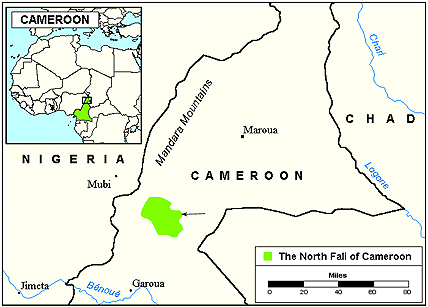The North Fali live in the northern region of Cameroon, north central Africa. This area is also inhabited by a number of other small tribes and the large, dominant Fulbe people. Although the North Fali are related to the Fali of Nigeria, the two groups have very distinct languages. The Fali speak an Afro-Asiatic language called Bana, while the North Fali speak Fali Nord, a Niger-Congo language. Despite their linguistic differences, the two groups have similar customs, religious beliefs and lifestyles. During the nineteenth century, the North Fali fiercely resisted Fulbe domination and fled into the Mandara Mountains, hills, and isolated valleys. Even today, the dominating power of the Fulbe persists. Though they trade with the Fulbe, there are bad feelings between the two ethnic groups.
The North Fali are primarily farmers. Their staple crops include sorghum and millet. They also grow maize, rice, beans, potatoes, peanuts and okra as secondary crops. They also grow cotton, indigo, and tobacco. Most of the farmers keep a small number of cattle, donkeys, goats, sheep, and chickens. They provide the families with protein, milk, and wool and may also be used as religious sacrifices. They raise bees and they often eat the honey.
The North Fali trade some of their grains, peanuts, and livestock to the Fulbe for salt, bread, and other essential items. They also trade cotton to people of neighboring cities for fabrics and household utensils. They are well known in the region for their industrial arts of doll-making and clay carving.
North Fali villages consist of several round dwellings made of mud-brick and having thatched roofs. The buildings are connected to one another by woven straw fences or hedges and are positioned so that there is an open area in the center. Each home has a kitchen, an attic, and a room for the husband; the wife lives in her own hut. Separate rooms are added to the house when the children reach puberty. Young single males live in their own square huts until they are married.
Within each family compound is a storeroom-chapel. They place special stones inside the shrine to represent the family's ancestors. Most dwellings also have shelters where people can gather to discuss family matters, play music, or fellowship.
The beauty of the body is very important to the North Fali. They are distinguished from other tribes by their colorful clothing. The men wear unique, rectangular-shaped loincloths, which are made from strips of cotton that have been sewn together. The front of the loincloth is carefully embroidered with colorful geometric patterns. The rest is decorated with glass beads and even pieces of pottery. Bracelets, necklaces and other ornaments are also worn by both men and women.
A majority of the North Fali have converted to Islam. This doesn't prevent them from adhering to pre-Islamic traditions. These ancient practices combine animism (belief that non-human objects have spirits) and ancestor worship (praying to the deceased for blessings, guidance and protection). One month after a person dies, they hold a ceremony called the "festivity of the dead." They believe that the deceased is then reincarnated (reborn into another body) and that he will live forever under the ground, only returning through means of a special mask. Some North Fali also believe in a creator god named Faw.
The Northern Fali people can use modern farming equipment to increase their yields. Ideally there would be good schools in medical clinics in each village, but this is rarely possible in rural Africa.
Pray for the Lord to prepare his workers with an abundance of the fruit of the Holy Spirit and send them to the North Fali people.
Pray for the North Fali people to have hearts that genuinely want truth and righteousness.
Pray that this will be the decade when the Lord breaks through to North Fali families and villages.
Scripture Prayers for the Fali, North in Cameroon.
| Profile Source: Joshua Project |











